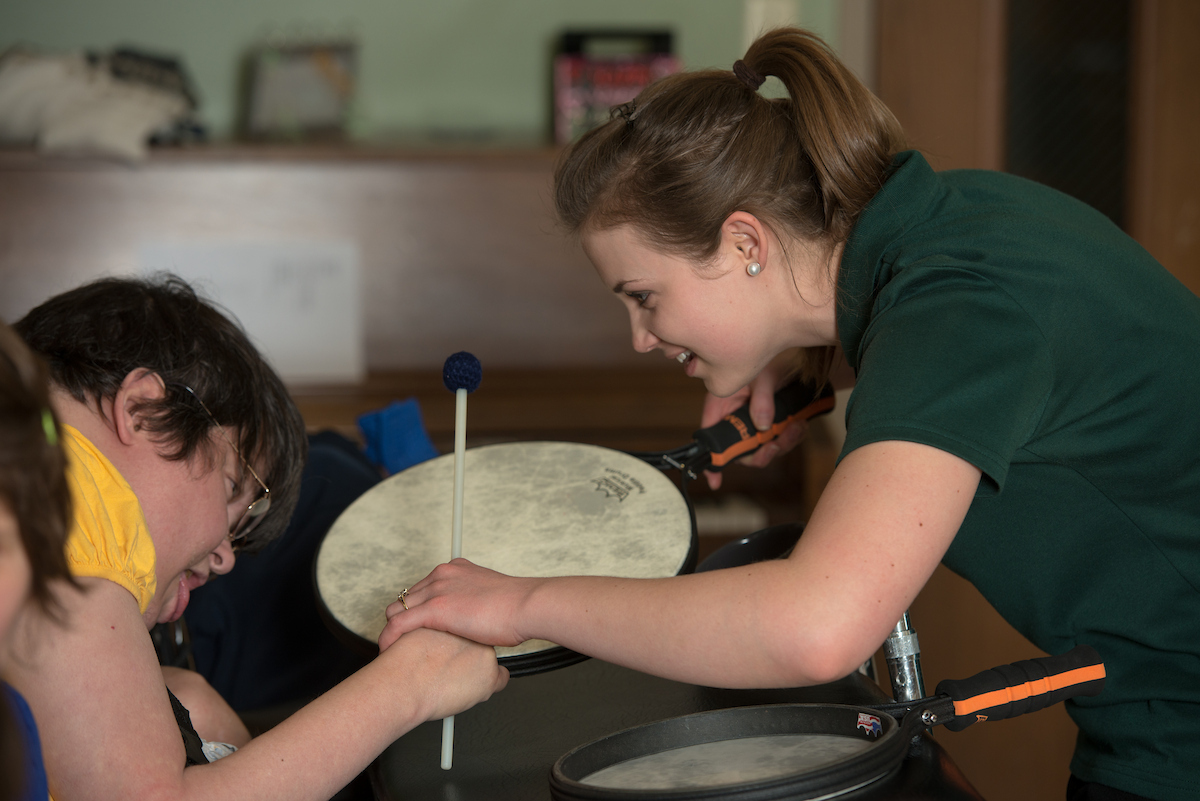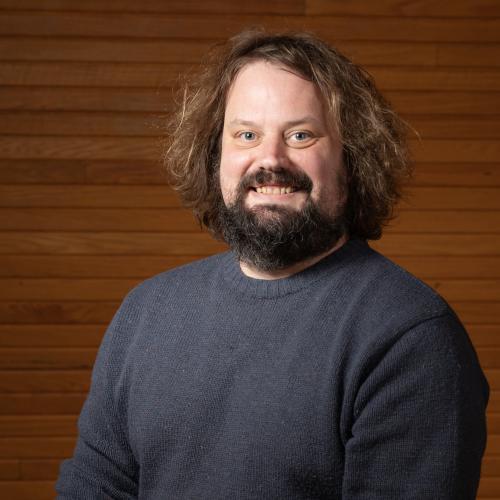
Explore the benefits of a masters in music therapy at Ohio University
Learn how Ohio University’s Master of Music in Music Therapy empowers professionals to heal through music, enhance clinical skills, and lead in this evolving field with advanced training and hands-on experiences.
December 12, 2024
Share:
Music has the power to move us. At Ohio University’s Master of Music in Music Therapy program, we see music as something even more profound: a way to help heal.
Ohio University’s Master of Music in Music Therapy offers a dynamic path for professionals looking to enhance their clinical skills. As a pioneering institution in music therapy education since 1951, Ohio University has built a legacy of training compassionate, creative, and critically thinking individuals who make meaningful change through music.
The program is designed for practicing music therapists and musicians interested in working in the field of music therapy. With advanced coursework and hands-on experiences, OHIO’s program equips students with the clinical expertise, research skills, and practical knowledge needed to lead in this evolving field.
How does music therapy impact local communities?
Ohio University's Master of Music in Music Therapy is a 34-credit program that equips students with the skills and knowledge needed to excel in a variety of music therapy careers. With a flexible curriculum, students can focus on areas that match their career aspirations, whether it's advanced clinical practice, research, teaching, or administration.
For those with an undergraduate degree in music therapy, this program provides the opportunity to deepen their expertise and gain advanced clinical skills. Musicians with a bachelor's degree in a field other than music therapy can enter the profession by completing music therapy equivalency coursework as part of their master’s studies.
Core courses include advanced clinical practicum, ethics in music therapy, and clinical musicianship, providing students with the tools to provide ethical and effective therapy across diverse client populations. Electives allow students to explore specialized areas of interest such as family studies, psychology, speech and language, and education, offering a well-rounded approach to music therapy.
How do faculty support music therapy students?
Music therapy faculty members guide students through the degree process with a focus on ethical practice and real-world application.
"We focus on the personal experiences of each individual student and get to know them well so that we can help them cultivate their own ideas of music therapy while staying true to the AMTA standards of practice and ethical considerations," says Andrew Holbrook, assistant professor of instruction in music therapy.
“Many our students come from different backgrounds and have different life experiences. The faculty try to highlight these differences in the classroom to learn from each other and develop empathic skills needed for the profession,” says Holbrook.
What are the current trends in music therapy?
As the field of music therapy evolves, Ohio University’s program adapts to meet the changing needs of clients and the profession. According to Holbrook, one emerging trend is the community-focused model of therapy, particularly in rural and underserved areas. Ohio University has taken a proactive role in training students to integrate themselves into their communities, learning about local resources and creating meaningful connections with clients.
“Trends in music therapy have a history of being geographically based due to the varying needs of clients in different environments,” says Holbrook. “Local resources and areas of strength within the Athens community are learned about and utilized by students working in various facilities throughout the county.”
The program encourages students to explore cutting-edge topics and techniques in the field. Recent student projects have included areas such as the use of video games in therapy, cultural fusion in music therapy, and augmentative communication devices. These forward-thinking initiatives reflect the program’s commitment to staying ahead of trends and preparing students for the future of music therapy.
How does music therapy help local communities?
A unique strength of Ohio University’s music therapy program is its community-based approach. Graduate students have the opportunity to engage directly with people living in the region, and to practice their skills in real-world settings.
"Within Athens, Ohio, and surrounding areas, we have taken a community approach where our students are active community members and are invested in community initiatives to better understand what their clients are experiencing on a daily basis," says Holbrook. This approach ensures that students not only understand the individual needs of their clients but also the broader social and cultural contexts in which they work.
This immersive experience not only benefits the community but also allows students to develop a deep understanding of the diverse needs and challenges their future clients may face. Through their practicum placements and internships, students cultivate the empathy and adaptability necessary for successful careers in music therapy.

Andrew Holbrook MA, MT-BC, assistant professor of instruction in music therapy
Incorporating alumni expertise into the music therapy program
Ohio University’s Music Therapy program maintains strong connections with its alumni, who work in a range of professional settings. These professionals often engage with current students in classes and internships to provide insights into the evolving music therapy landscape.
“We try to get these professionals talking with students as often as possible so that they know and understand the most current professional landscape they are about to enter.” This interaction helps bridge the gap between academic learning and real-world practice,” says Holbrook.
What are some careers options with a master’s in music therapy?
Graduates of Ohio University’s Master of Music in Music Therapy program are well-equipped to pursue a variety of careers in the field. Alumni hold positions in hospitals, schools, mental health centers, private practice, and even higher education. Some have gone on to take leadership roles, while others have started thriving private practices.
"Graduates from the OU music therapy program maintain prominent positions in a variety of clinical areas, regional administrative roles, and higher education,” says Holbrook. “Throughout the curriculum, students learn a variety of methods and philosophies of music therapy, making them flexible and adaptable to various situations that could arise in a clinical setting."
By providing students with a strong foundation in clinical practice, research, and teaching, Ohio University ensures that its graduates are prepared to meet the demands of an ever-growing profession. Music therapists today are needed more than ever in healthcare, education, and mental health settings, and Ohio University graduates are ready to take on those challenges.
Shaping the future of music therapy at OHIO
As the field of music therapy continues to grow, Ohio University is committed to preparing its students to be ethical and innovative leaders. The faculty work closely with students to develop the critical thinking and problem-solving skills needed to navigate the challenges and opportunities in this evolving profession.
Holbrook envisions the future of music therapy favoring those who are proactive and client-centered.
"In the future, I think the field will favor self-directed individuals who have found their intrinsic motivation to always be bettering themselves, those who are creative problem solvers that aren’t afraid to make mistakes, and those who center their clients rather than methodology."
Why pursue a master’s in music therapy at Ohio University?
With a long-standing tradition of excellence in music therapy education, combined with its innovative curriculum and hands-on community experiences, OHIO is a top choice for students interested in advancing their careers in music therapy. Whether you're a current music therapist looking to deepen your practice or a musician seeking to transition into this rewarding field, Ohio University provides the tools and support to help you succeed.
To learn more about Ohio University's Master of Music in Music Therapy program and how it can help you make a difference through music, visit the program's website for more information.
